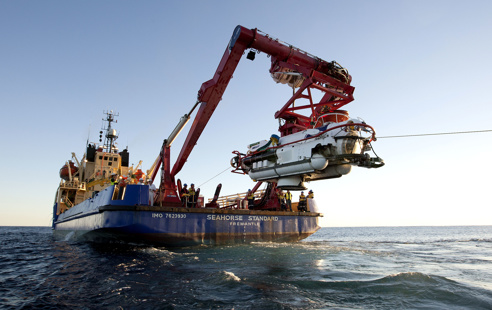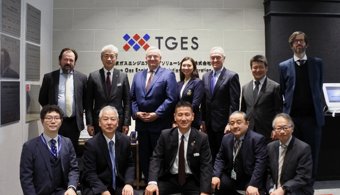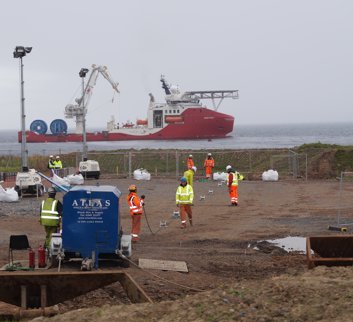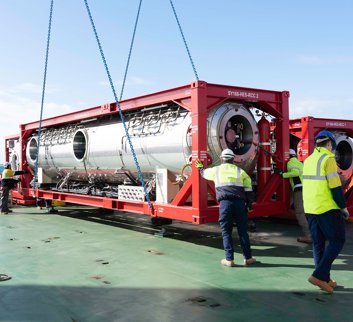
James Fisher's principal risks and uncertainties.
Managing risk and enabling growth
The Group's emerging and principal risks:
The Group is subject to a combination of macro risks and business-specific risks. The Group’s risk management process provides the framework for risk management practices across all parts of the Group and seeks to ensure that business risks are adequately identified, quantified and understood. The framework and accompanying risk management processes continue to evolve and improve across the Group.
Changes in 2022:
The Group continues to implement improvements in risk management, with a number of ongoing projects continuing to deliver in 2023, including a continual review of principal risks. As a result of these reviews, three additional principal risks have been separately articulated, reflecting specific situations that the Group is subject to and seeking to mitigate: Acquisitions and disposals risk, regulatory and compliance risk, and product risk. Pandemic risk which was separately disclosed in the prior year has been mitigated to the point where it has been removed from the Group’s principal risks. Emerging risks such as the macroeconomic financial environment and geopolitical tensions affecting global stability and commodity pricing continue to be monitored.
During 2023 the Group hired a Head of Ethics and Compliance to enhance its risk management in this critical business area. The Head of Ethics and Compliance has led a review of all Group policies with a view to providing a common and simplified structure to the Group’s Governance documentation. This will be accompanied by a comprehensive training programme for all staff during 2024.
In addition to the above, new and enhanced governance has been implemented to ensure ongoing compliance with the Group’s Revolving Credit Facility requirements; the Group’s Investment Committee has become an increasingly important cornerstone of the Group’s risk management framework; the Sustainability Committee is under new leadership and has a sharper focus; and the Board continued with its ongoing cycle of principal risk deep dives at each Board meeting.

Explore our principal risks and uncertainties below
| Nature: | Potential impact: | Mitigation: |
|
The Group is in a period of significant |
|
|
| Context: |
|
The Group is undertaking a transformation including a new strategy, operating model and initiatives such as supply chain, technology improvements and a people strategy as well as aligning the business portfolio. Additionally, new opportunities that the Group may pursue in new geographies may stretch Group and management resources. Strong project management and clarity on roles and responsibilities will be required to ensure that the delivery teams remain focused on the most important identified tasks |
|
Movement: |
|
No change. Progress was made during 2023 in setting common standards and practices across Health & Safety and Project Management. The next priority areas for the Group are Commercial Excellence and Supply Chain. The transformation programme is expected to continue throughout 2024 and into 2025. |
| Opportunity: |
| The opportunity to simplify the Group’s operating model, integrating common functions such as Supply Chain, Project Management, Engineering, Health and Safety is aimed at providing enhanced ways of working and operational efficiencies. It is also expected to support the simplification of the Group’s legal entity structure and systems infrastructure in due course. |
| Nature: | Potential impact: | Mitigation: |
|
The Group relies on external sources of funding to ensure it has the financial liquidity to fund its operations and |
|
|
| Context: |
|
The Group has experienced difficult trading conditions over the last few years and currently has a revolving credit facility (RCF) which matures in 2025 and net debt/EBITDA ranges which are currently outside our target range. To minimise this risk the Group has to strengthen its balance sheet and obtain and retain adequate committed facilities. |
|
Movement: |
|
No change. The short-dated maturity of the existing RCF remains a principal risk to the Group, which is also highlighted by the Group’s auditor, KPMG LLP, in their Independent Audit Report. |
| Opportunity: |
| The Group expects that a refinancing of the current facilities will be completed before 31 December 2024 which would allow to simplify and right-size its borrowing facilities and provide additional certainty to all stakeholders. The Group has developed a financing plan for the period which will include refinancing of the RCF and also consideration of other funding sources to diversify bank risk and extend tenor. |
| Nature: | Potential impact: | Mitigation: |
|
Group trading companies may experience an adverse operational |
|
|
| Context: |
|
Our operations entail the potential risk of significant harm to people and property, wherever we operate across the world. For moral, financial and reputational reasons we would wish to keep the risk as low as possible. |
| Movement: |
|
No change. The number of incidents reported in 2023 did not show an improvement compared to 2022. |
| Opportunity: |
|
Operating in competitive markets there is an increased opportunity to provide differentiation to our customers by our strong commitment to health and safety, thereby building long-term trust. |
| Nature: | Potential impact: | Mitigation: |
|
The Group may experience loss or harm related to technical infrastructure or the use of technology within the Group. |
Cyber attacks could result in financial and |
|
| Context: |
|
A key factor for our customers is our ability to deliver secure IT and other information assurance systems to maintain the confidentiality of sensitive information. IT and Cyber Security are fundamental components to our operations and we continually review the emergence of cyber threats, in an effort to eradicate and mitigate the risk as far as possible. |
| Movement: |
|
No change. The Group is reliant on its systems in order to operate effectively and has continued to invest to enhance cyber resilience. The external threat is continually adapting and increasing, notwithstanding the mitigating activities |
| Opportunity: |
| Upgraded IT systems increase security, but also flexibility, facilitating secure working while travelling or from home. |
| Nature: | Potential impact: | Mitigation: |
|
The Group operates in overseas |
Those operations may expose the Group to increased risk of governance and compliance |
|
| Context: |
|
We rely on winning and retaining contracts in both existing and new markets with a variety of customers including major energy customers and customers owned, controlled, or funded by national governments. This reflects that, whilst the maintenance of a secure and assured pipeline is essential for continued growth, we may choose to embrace the risks that we can confidently and securely manage. |
| Movement: |
|
No change. Commercial and financial controls, project management and risk management, along with increasing Group awareness in this area continue to mitigate the risk. |
| Opportunity: |
| The Group’s ability to operate in emerging markets for global customers offers an increased opportunity to be differentiated from our competitors. |
| Nature: | Potential impact: | Mitigation: |
|
The Group operates in industries which |
The Group may suffer operational impacts of |
|
| Context: |
|
Sustainability is an integral part of our corporate strategy, and our global business employs short-, medium-, and long-term control measures to manage climate-related risks. |
|
Movement: |
|
No change. The Group has built its strategic goals around sustainability, driven in part by the impacts of climate change on the Group and the markets it serves |
| Opportunity: |
| Energy markets remain a key source of Group revenue, including both the oil and gas and renewables industries. With the strategic focus of the Group supporting the “energy transition”, from oil and gas to renewables, with increased investment in oil and gas decommissioning and renewables markets, the Board continues to consider the impact of climate change on energy markets as one of the Group’s principal risks, as well as one of the Group’s key strategic opportunities. |
| Nature: | Potential impact: | Mitigation: |
|
The Group operates in markets where |
Through its growth and diversification into new markets and geographies, the Group may be exposed to increased contractual risks, which could result in financial impact caused by late |
|
| Context: |
| We execute contracts which often require us to price for the long-term and for risk transfer. Our contracts can include fixed prices. The Board and Executive Committee continue to monitor key contractual risks through the Group’s Investment Committee, which has a defined delegation of authority and approves all opportunities that require Board approval before they are submitted to the Board. There is continued use of internal and external legal support and clear escalation mechanisms to govern the granting of commitments. |
|
Movement: |
|
No change. The Group is diversifying its operations to secure a more sustainable future for its energy businesses and that will bring its own challenges whilst the Group adjusts to new customer expectations and industry developments |
| Opportunity: |
| As the Group pursues its strategy, contracts become a key mechanism for managing risk and also enhancing engagement with our customers and suppliers. |
| Nature: | Potential impact: | Mitigation: |
|
Group businesses may fail to meet customer expectations or contractual requirements on project delivery. |
This could cause significant adverse financial and |
|
| Context: |
| We operate contracts in hazardous environments with contracts that could be subject to change and require robust project management. |
| Movement: |
| No change. The Group continues to have some mixed success on project delivery and with two large projects due for delivery in 2024 in Mozambique this remains an area of significant focus for the future. The Business Excellence team made Project Management a priority for 2023, focusing on those businesses that have historically underperformed in this area. |
| Opportunity: |
| Our customers require suppliers which can manage large projects in demanding environments. The Group is in a key position to support them, grow our customer engagement, and win new work. |
| Nature: | Potential impact: | Mitigation: |
|
The Group may fail to attract, retain and develop personnel of the requisite calibre and to plan for succession in key leadership positions. |
This may result in the Group not being able to |
|
| Context: |
|
We operate in many specialised engineering and technical domains which require appropriate skills and experience. Progress continues on implementation of the employee strategy to improve recruitment and retention. |
| Movement: |
|
Increase. Several senior management changes have been implemented during the year and the recruitment market for talent remains highly competitive. |
| Opportunity: |
| Improvements in recruitment and retention will strengthen our teams worldwide, as well as the ability to compete in our chosen markets. |
| Nature: | Potential impact: | Mitigation: |
|
The Group is exposed to interest rate, |
An increase in interest rates or change in exchange rates or credit restriction would have a financial impact on the Group. Poor financial controls may impact adversely on reporting accuracy or risk of fraud. |
|
| Context: |
|
The Group is exposed to a number of financial risks, some of which are of a macroeconomic nature (for example, foreign currency, interest rates) and some of which are more specific to the Group (for example, liquidity and credit risks). The Group has recognised the adverse effects of the financial resilience risk on our balance sheet and will actively manage this risk via its capital allocation policy and Treasury function. |
| Movement: |
| Increase, due to current covenant compliance risk, albeit the Group remained in compliance with all banking covenants for 2023. |
| Opportunity: |
| The Group’s hedging policies are designed to provide certainty on cash flows. The internal controls improvement project is aimed at enhancing efficiency as well as strengthening control. |
| Nature: | Potential impact: | Mitigation: |
|
The Group may execute a transaction |
The Group may incur additional costs and |
|
| Context: |
|
The Group has been formed organically and through acquisition. If we believe that a business is not in line with strategic plans, we may decide to sell that business. Transactions can be complex, time-consuming, and expensive. The Group will continue to review potential opportunities within the market in a considered and measured way. Transactions will be undertaken where it is possible to reduce inherent risk. |
| Movement: |
| This risk is being separately disclosed for the first time. |
| Opportunity: |
|
Disposals will allow the Group to focus on core businesses and simplify its structure and cost base whilst acquisitions present growth |
| Nature: | Potential impact: | Mitigation: |
|
The Group is subject to a number of |
Failure to maintain compliance could affect our |
|
| Context: |
|
Our businesses are subject to the laws, regulations and restrictions of the many jurisdictions in which they operate. The Group seeks to ensure compliance with best practices and regulatory requirements. The Group has a zero-tolerance for regulatory risk around risks such as anti-bribery and corruption and modern slavery. |
| Movement: |
| This risk is being separately disclosed for the first time. |
| Opportunity: |
|
Compliance with laws and regulations enhances our reputation, credibility and trust with our suppliers and customers, ensures access to capital and investment opportunities and provides opportunities for market expansion. |
| Nature: | Potential impact: | Mitigation: |
|
The Group is subject to re-work and/or |
The Group may occur additional costs in the |
|
| Context: |
|
The Group designs innovative products for use in the Energy, Defence and Maritime Transport markets. With any new product development |
| Movement: |
| Decrease. The impact during 2022 was largely limited to the JFD business. |
| Opportunity: |
|
Delivery of consistently high quality products builds long-term trust providing access to potential future business. |
Identifying emerging risks
Our risk management programme includes a review of emerging risks.
We define emerging risks as those which take the form of a systemic issue or business practice that has either not previously been identified, has been identified but has remained dormant, or has yet to rise to an area of significant concern. The Risk Committee is continuing to work on improvements in this area and the Group included ongoing macroeconomic and geopolitical uncertainty as emerging risks in its Interim Financial Statements.
James Fisher's governance


Sign up to regulatory news services (RNS) alerts from James Fisher and Sons plc (LSE: FSJ).
Our latest news
Discover the latest stories from across James Fisher

James Fisher completes its largest decommissioning project to date
Read article
James Fisher secures its first tidal energy project in Anglesey, UK
Read article
James Fisher secures commissioning contract worth over one million pounds at Zhong Neng offshore wind farm in Taiwan
Read article
James Fisher and Tokyo Gas Engineering Solutions sign a Joint Collaboration Agreement to deliver offshore wind Operations and Maintenance services in Japan
Read article
Full Year Trading Update for Year Ended 31 December 2023
Read article
Appointment of Independent Non-Executive Director
Read articleJFD secures contract with TechnipFMC enhancing portable hyperbaric rescue capability and global support of diver safety
Read article
James Fisher christens Lady Maria Fisher in vessel naming ceremony at Port of Sunderland
Read article










 Annual Report 2023
Annual Report 2023